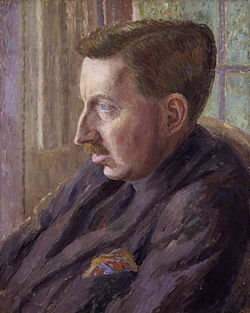E.M. Forster Quote
If human nature does alter it will be because individuals manage to look at themselves in a new way. Here and there people — a very few people, but a few novelists are among them — are trying to do this. Every institution and vested interest is against such a search: organized religion, the State, the family in its economic aspect, have nothing to gain, and it is only when outward prohibitions weaken that it can proceed: history conditions it to that extent. Perhaps the searchers will fail, perhaps it is impossible for the instrument of contemplation to contemplate itself, perhaps if it is possible it means the end of imaginative literature — [...] anyhow—that way lies movement and even combustion for the novel, for if the novelist sees himself differently, he will see his characters differently and a new system of lighting will result.
If human nature does alter it will be because individuals manage to look at themselves in a new way. Here and there people — a very few people, but a few novelists are among them — are trying to do this. Every institution and vested interest is against such a search: organized religion, the State, the family in its economic aspect, have nothing to gain, and it is only when outward prohibitions weaken that it can proceed: history conditions it to that extent. Perhaps the searchers will fail, perhaps it is impossible for the instrument of contemplation to contemplate itself, perhaps if it is possible it means the end of imaginative literature — [...] anyhow—that way lies movement and even combustion for the novel, for if the novelist sees himself differently, he will see his characters differently and a new system of lighting will result.
Related Quotes
With school turning out more runners, jumpers, racers, tinkerers, grabbers, snatchers, fliers and swimmers instead of examiners, critics, knowers and imaginative creators, the word 'intellectual' of c...
About E.M. Forster
Considered one of the most successful of the Edwardian era English novelists, he was nominated for the Nobel Prize in Literature in 22 separate years. He declined a knighthood in 1949, though he received the Order of Merit upon his 90th birthday. Forster was made a Member of the Order of the Companions of Honour in 1953, and in 1961 he was one of the first five authors named as a Companion of Literature by the Royal Society of Literature.
After attending Tonbridge School, Forster studied history and classics at King's College, Cambridge, where he met fellow future writers such as Lytton Strachey and Leonard Woolf. He then travelled throughout Europe before publishing his first novel, Where Angels Fear to Tread, in 1905. The last of his novels to be published, Maurice, is a tale of homosexual love in early 20th-century England. While completed in 1914, the novel was not published until 1971, the year after his death.
Many of his novels were posthumously adapted for cinema, including Merchant Ivory Productions of A Room with a View (1985), Maurice (1987) and Howards End (1992), critically acclaimed period dramas which featured lavish sets and esteemed British actors, including Helena Bonham Carter, Daniel Day-Lewis, Hugh Grant, Anthony Hopkins and Emma Thompson. Director David Lean filmed another well-received adaptation, A Passage to India, in 1984.
